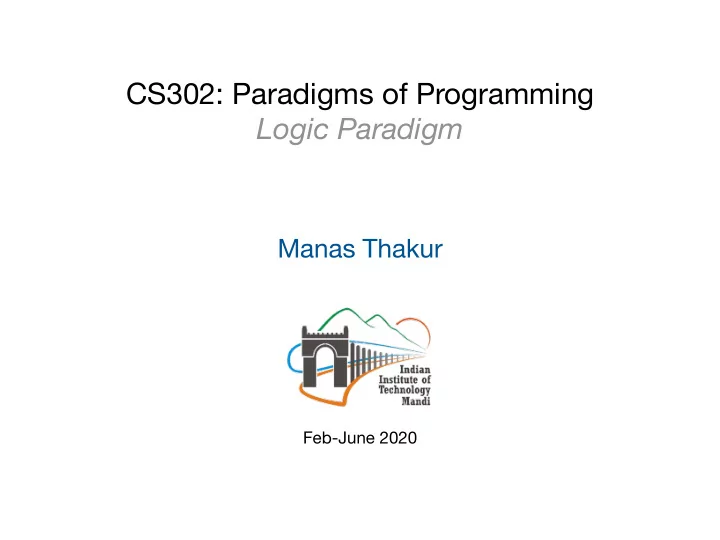

CS302: Paradigms of Programming Logic Paradigm Manas Thakur Feb-June 2020
Declarative vs Operational • Square root of x : • A number y such that y 2 = x Declarative • Newton’s method Operational 2
Sum a list of numbers: Imperative (Java) int sum(int[] list) { int result = 0; for (int i = 0; i < list.length; i++) { result += list[i]; } return result; } 3
Sum a list of numbers: Functional (Scheme) (define (sum list) (if (null? list) 0 (+ (car list) (sum cdr list)))) 4
Sum a list of numbers: Logic (Prolog) sum([], 0). sum([H | T], N) :- sum(T, M), N is H + M. Functional is sometimes close to declarative, but logic is closer. 5
Logic Paradigm • Programs consist of just facts and rules . • Not necessary to describe the “procedure” or the control flow at a very low-level. • Who does the computation then? • In other words, who has the onus of translating the “declarative” description to an “algorithm” that computes on the von-Neumann architecture? • The Interpreter ! 6
Logic Paradigm: Usage • Prolog quite popular in rule-based Artificial Intelligence. • Datalog becoming very popular in program analysis, code optimization, and type inference. • SQL already the de-facto of relational databases. 7
Predicates and Horn Clauses • If it is precipitating in a city C and the temperature in C is freezing, then it is snowing in C. Predicates • snowing(C); precipitation(C); freezing(C) • snowing(C) <- precipitation(C) AND freezing(C) Horn Clause • When does it snow at Kamand? • Instantiate the variables. PC: Rishi Sharma 8
9
Favorite GoT House? 10
(The Shortest?) Introduction to Prolog • Two kinds of terms : Rules of the game ( aka Syntax) : • Constants start with small letters. • Variables start with capital letters. • Facts • Full stop necessary after each fact/rule. • No space before the opening • father(ned, arya). parenthesis. • Multiple terms with the same head • mother(catelyn, bran). indicate disjunction. • A comma between terms indicates conjunction. • Rules • parent(X, Y) :- father(X, Y). • parent(X, Y) :- mother(X, Y). • grandparent(X, Z) :- parent(X, Y), parent (Y, Z). 11
Querying in Prolog Homework: Define rules • ?- father(ned, sansa). cousin, uncle, aunt, sibling . • ?- grandparent(rickard, bran). Closed World Assumption • Inferences can be drawn only from known facts. 12
Recommend
More recommend